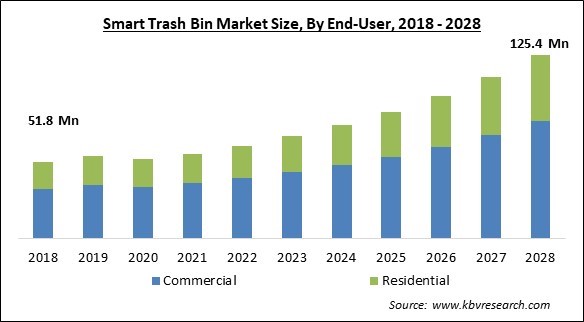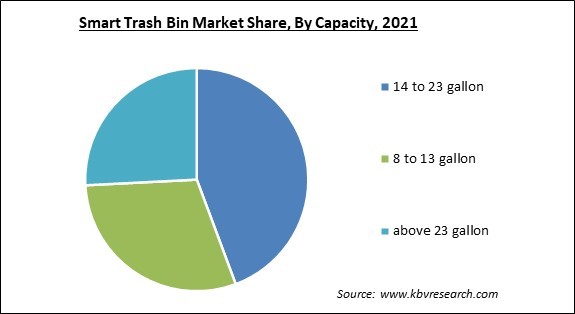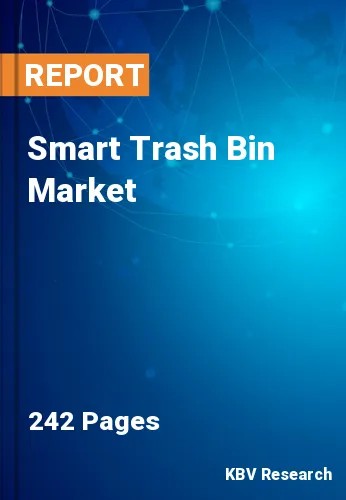The Global Smart Trash Bin Market size is expected to reach $125.4 Million by 2028, rising at a market growth of 12.1% CAGR during the forecast period.
A smart trash bin is an innovative waste management system that is highly technologically advanced. It contains wireless ultrasonic sensors installed within and uses IoT to monitor the bin. A cloud-based analytics and monitoring platform receives this data after that. Diverse sensor types with unique functions are used in smart trash can deployment. The waste collection teams are alerted by the fill level sensor to clean up the bins when they are approximately 70% full.

This enables the trash collection crew to promptly empty the bins. The sewage drain covers in modern smart cities have sensors that can determine when the sewage is overflowing and alert the relevant teams. Smart trash cans cut infrastructural, operating, and maintenance costs by 30%. The city is kept clean using smart trash bins to keep the area tidy and free of undesirable garbage scents.
The need for smart trash bins is anticipated to increase due to the decrease in the number of workers needed to manage waste collection. Leading companies worldwide are launching smart trash bins with distinctive materials and cutting-edge technology to assist customers in streamlining logistics, cutting costs, and protecting the environment. In the upcoming years, this is anticipated to increase demand for the product.
The time and labor demands of the old methods of waste management make them ineffective today. In order to track and control trash, many firms are now seeking creative solutions. As a result of these developments and the market potential, a number of technology companies have started developing innovative products such as sensors, analytical platforms, as well as RFID tags. These products are developed with the intention of assisting the stakeholders in the waste management industry in collecting, processing, and disposing of waste in an effective manner.
The pandemic impacted worldwide supply chains, delaying the manufacture and delivery of smart trash bins. In addition, due to the restricted supply of some models, the delay further caused prices to increase. Further factors that reduced the supply of smart trash bins was that some manufacturers switched their attention from making smart trash bins to developing critical medical equipment and supplies due to the COVID-19 pandemic. However, because of the regulations allowing employees to work from home, the outbreak slowed the development of smart trash bins in various industries, including public locations and commercial offices. As a result, the pandemic moderately impacted the smart trash bin market.
Waste management systems are under pressure due to the rising worldwide garbage production. Numerous local government entities have run various innovative programs nationwide to address these issues. For instance, the Environmental Protection Agency (EPA) announced in November 2021 that it would invest approximately USD 375 million in recycling and waste reduction projects, which would be one of the most significant investment in waste management systems in the US. Using the money, several new initiatives to fight pollution and improper waste management would be started at the state and local levels, such as the Recycling Education and Outreach Grant Program and the Solid Waste Infrastructure for Recycling Program. This will propel the growth of the smart trash bin market.
Real-time data on the production, collection, and disposal of waste is produced through smart trash cans. This collected data can be assessed using AI algorithms to find patterns and further improve waste management systems. As cities and businesses emphasize sustainability and environmental responsibility, the market for smart trash bin has a lot of room for expansion and innovation. Smart trash bins have the potential to revolutionize waste management procedures and advance a more sustainable future by utilizing AI, IoT, and other technologies. Hence the incorporation of technology has increased the favorability and adaptability of these bins and thus will drive the expansion of the market.
High initial expenditures for sensors, software, and installation are associated with deploying smart trash bins. As a result, small and medium-sized businesses, local governments, and other organizations with tight finances may find it to be a substantial barrier. In addition, the maintenance and system upgrades may be difficult due to the smart trash bin systems' technological sophistication. Additionally, the widespread accessibility of many alternative trash disposal options, which are also cheaper, poses significant challenges regarding implementing smart trash bins. Because it is affordable and simple to use, users continue to find traditional bins to be more convenient. Therefore, these factors may significantly hamper the market's growth throughout the forecast period.
Based on capacity, the smart trash bin market is fragmented into 8 to 13 gallon, 14 to 23 gallon, and above 23 gallon. The 14 to 23 gallon segment procured the largest revenue share in the smart trash bin market in 2021. The segment’s supremacy can be due to the accessibility of a wide range of products in volumes ranging from 13.2 to 14, 15, 18, and 22 gallons, among others. Also, trash bins with a larger capacity are needed to hold the massive amounts of junk produced by hotels, hospitals, and public restrooms, among other places. Therefore 14 to 23 gallons are particularly popular in the commercial and business sectors.

On the basis of sales channel, the smart trash bin market is bifurcated into online and offline. The online segment witnesses a substantial revenue share in the smart trash bin market in 2021. Every product can be successfully marketed online, including smart trash cans, actively promoted by industry players on online marketplaces. The demand for smart garbage cans through online channels is anticipated to increase since internet platforms give clients more options to browse and choose the required product. In addition, retail outlets carry many brands and provide quick product delivery, including Amazon, eBay, and omnichannel stores like Walmart and Costco.
Based on end-user, the smart trash bin market is categorized into residential and commercial. The commercial segment garnered the highest revenue share in the smart trash bin market in 2021. As smart trash bins gain popularity in commercial sectors because of their capacity to simplify waste management procedures, save costs, and enhance sustainability efforts, the commercial segment is expected to rise. To manage waste more effectively and efficiently, smart trash bins use various technologies, including data analytics, sensors, and IoT. Commercial places like airports, hospitals, hotels, etc., extensively use smart trash bins.
On the basis of operation, the smart trash bin market is divided into automatic and semi-automatic. The semi-automatic segment recorded a significant revenue share in the smart trash bin market in 2021. Semi-automatic bins are garbage disposal units that need human assistance to operate or open the trash can. Furthermore, semi-automatic bins allow for manual control while offering a practical and hygienic manner to dispose of waste. The growing use of these bins in homes, workplaces, or public areas are propelling the segment’s expansion.
Based on compartment, the smart trash bin market is segmented into single-compartment and multi-compartment. The multi-compartment segment witnessed the maximum revenue share in the smart trash bin market in 2021. Multi-compartment smart trash bins are waste disposal units with distinct sections to gather various waste types. Most of the time, these bins have sensors that identify the type of waste being disposed of as well as further organize it into the proper compartment. This makes sorting waste into biodegradable and non-biodegradable easier. As a result, an increasing number of governments worldwide are using multi-compartment bins, thereby propelling the segment's growth.
| Report Attribute | Details |
|---|---|
| Market size value in 2021 | USD 57.7 Million |
| Market size forecast in 2028 | USD 125.4 Million |
| Base Year | 2021 |
| Historical Period | 2018 to 2020 |
| Forecast Period | 2022 to 2028 |
| Revenue Growth Rate | CAGR of 12.1% from 2022 to 2028 |
| Number of Pages | 242 |
| Number of Table | 490 |
| Report coverage | Market Trends, Revenue Estimation and Forecast, Segmentation Analysis, Regional and Country Breakdown, Companies Strategic Developments, Company Profiling |
| Segments covered | Sales Channel, Capacity, Operation, Compartment, End-User, Region |
| Country scope | US, Canada, Mexico, Germany, UK, France, Russia, Spain, Italy, China, Japan, India, South Korea, Singapore, Malaysia, Brazil, Argentina, UAE, Saudi Arabia, South Africa, Nigeria |
| Growth Drivers |
|
| Restraints |
|
On the basis of region, the smart trash bin market is analyzed across North America, Europe, Asia Pacific, and LAMEA. The North America segment procured the highest revenue share in the smart trash bin market in 2021. The presence of well-known smart trash bin producers and sellers in North America, such as Simplehuman and Nine Stars Group (USA) Inc., can be credited with the region's growth. These players prioritize strategic growth through mergers, acquisitions, and introducing new products. Due to the region's strong willingness to adopt cutting-edge technology, smart trash bin sales are also surging, especially in the United States.
Free Valuable Insights: Global Smart Trash Bin Market size to reach USD 125.4 Million by 2028
The market research report covers the analysis of key stake holders of the market. Key companies profiled in the report include Ausko Pte Ltd, iTouchless Housewares and Products, Inc., Ecube Labs, Simplehuman, EKO North America, EvoEco, CleanRobotics Technologies, Inc., Home Depot, Inc., Sensortec s.r.o. (Binology.com), and Big Belly Solar, Inc.
By End-User
By Sales Channel
By Capacity
By Operation
By Compartment
By Geography
The global Smart Trash Bin Market size is expected to reach $125.4 Million by 2028.
Incorporation of technology expanding the use of bins are driving the market in coming years, however, High cost of installation and availability of cheaper options restraints the growth of the market.
Ausko Pte Ltd, iTouchless Housewares and Products, Inc., Ecube Labs, Simplehuman, EKO North America, EvoEco, CleanRobotics Technologies, Inc., Home Depot, Inc., Sensortec s.r.o. (Binology.com), and Big Belly Solar, Inc.
The Offline segment acquired maximum revenue share in the Global Smart Trash Bin Market by Sales Channel 2021 thereby, achieving a market value of $65 Million by 2028.
The North America market dominated the Global Smart Trash Bin Market by Region 2021, and would continue to be a dominant market till 2028; thereby, achieving a market value of $40.5 Million by 2028.
Our team of dedicated experts can provide you with attractive expansion opportunities for your business.

